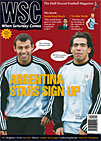 Wearside has seen an unlikely football marriage, but Paul Doyle looks behind the headline spats to see how much Roy Keane and Niall Quinn have in common and assess their chances of survival
Wearside has seen an unlikely football marriage, but Paul Doyle looks behind the headline spats to see how much Roy Keane and Niall Quinn have in common and assess their chances of survival
Niall Quinn often comes across as a Ronan Keating-type figure. There’s something earnest about the two Dubliners that denotes a craving to be perceived as nice guys. And there’s something essentially gormless in their demeanours that frequently suggests they’re both merely well meaning simpletons not to be taken seriously in the real, nasty world. So when Quinn first declared his intention to take over Sunderland, many in his homeland greeted the news with the same mixture of pity and amusement that they felt several years ago when Keating expressed an interest in becoming president of Ireland.
That’s why many chortled along with Roy Keane every time he scoffingly referred to Quinn as Mother Teresa. And that’s why so many were astonished when Keane was unveiled as Quinn’s subordinate at Sunderland. It’s not hard to imagine Quinn seeking Keane solely because he feels duty-bound to redeem sinners – and that the job offer was an extension of the ill-advised handshake he attempted as Keane walked off the Stadium of Light pitch in 2002 after being sent off for whacking Jason McAteer. But why did Keane accept? Why would the ultimate ruthless professional agree to work under someone he considered a joke?
One possibility is that, recognising the potential of Sunderland, with its facilities, huge fan base and deep-pocketed backers, Keane resolved to climb aboard the bandwagon then neutralise the Quinn nuisance. According to this conspiracy theory, the callous and calculating Keane will gradually usurp the naive beanpole who foolishly welcomed him into the fold.
But that, like most conspiracy theories, is probably bollocks. The truth is, Quinn and Keane are more complex than their popular images suggest. “The first is a whole lot tougher than he’s given credit for, the second far more flexible,” wrote Tom Humphries, who, as Quinn’s biographer and Keane’s favourite journalist, well knows that the pair actually have a lot in common. The most noticeable trait they share is pragmatism. Practical demands, not wishy-washy ideals, led Quinn to back Mick McCarthy over Keane during the World Cup fiasco in 2002 – while simultaneously working behind the scenes to broker a Keane comeback. Keane appears now to accept this. Perhaps retirement has clarified his thoughts; or maybe he has been impressed by Quinn’s ability to rally an eight-man consortium to rescue Sunderland: after all, hard-nosed businessmen aren’t prone to entrusting their money to a muppet, the term Keane called Quinn in his autobiography.
Not that Keane was the only one who needed convincing. Despite his insistence that the former Manchester United captain had been his number-one target from the outset, the fact is Quinn wasn’t convinced by Keane. Not only was he still hurt by the fallout from 2002, but, sources say, he wondered if Keane was sufficiently comfortable within himself to be reliable. That wouldn’t have been a judgment he reached lightly – after all, he devoted much of his own autobiography to exploring the complexities and contradictions of Keane’s make-up – but it’s why, when asked last year on Sky if he thought Keane would one day make a good manager, he replied: “No, I don’t think so.”
At least four members of the consortium wanted Keane from day one. But when their initial approach, back in May, was rebuffed, Quinn convinced them to appeal to Martin O’Neill and Sam Allardyce, his preferred candidates. It was only when these two rejected his advances, and he himself made such a cack-handed start to the season, that Quinn actively pursued Keane. By then Keane may have been attracted not only by the facilities, fans and financiers, but also by the fact that, no matter how bad a manager he turned out to be, he couldn’t possibly be accused of making Sunderland worse than they already were.
Which isn’t to say he’ll be a bad gaffer. There’s no doubting his footballing intelligence and attention to detail. Nor can one dispute his ability to inspire. The transfers he made before the window closed show he’s not deluded about the nature of the task: Graham Kavanagh, Liam Miller and David Connolly are patently below the standard Keane would have expected at United, but are good Championship players.
And the very fact that so many players who’ve worked with him in the past were willing to sign for him proves that he’s not the cartoon bully he’s often depicted as. While he’s already warned players against “slacking off”, they will also know that they can have some fun under Keane. How else to explain the arrival of Dwight Yorke?
From WSC 236 October 2006. What was happening this month